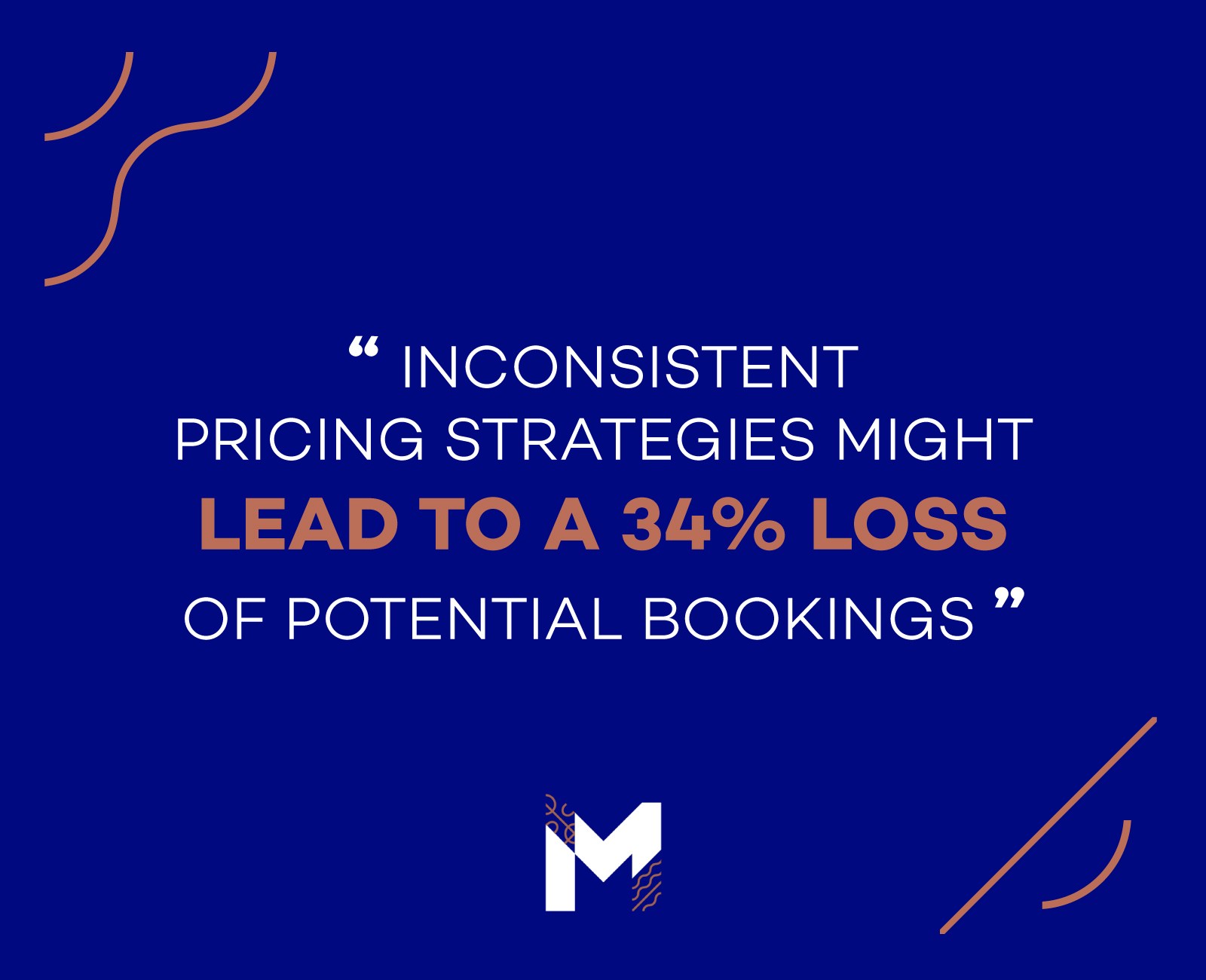THE STRATEGIC POWER OF HOTEL PRICING: HOW CAN HOTELS DRIVE DIRECT BOOKINGS & PROFITABILITY IN A DIGITAL LANDSCAPE.
Journal / Hospitality & Travel / 18.10.23
In the world of luxury hospitality, where comfort and opulence coexist, one element stands out as a key to success: the hotel pricing strategy. Especially in destinations like Greece, where the competition is fierce and the stakes are high, understanding the fluctuations in pricing becomes paramount. These fluctuations become even more complicated when we bring OTAs, such as Booking.com, into the picture.
The Role of Room Pricing in Decision Making

Every guest’s booking journey often begins with a simple click on a digital ad. However, the final step of this journey, making a reservation, is significantly influenced by the price they come across next. Envision a scenario where a potential guest is presented with different rates on an OTA compared to the hotel’s official website. In such a tug-of-war, the more economical rate usually prevails.
Recent industry studies indicate that an inconsistent dynamic pricing strategy in hotels might lead to losing as much as 34% of potential bookings. A consistent rate across platforms not only increases a hotel’s digital visibility but also increases the likelihood of a conversion.
Decoding Booking.com’s Offerings
Booking.com’s Genius program attempts to entice hotels with the promise of increased visibility, achieved through offerings like “free room upgrade” and “free breakfast”. While these offerings appear appealing on the surface, the underlying question remains: do they genuinely offer tangible value to hotels?

- The Genius Blueprint: Available only to a subset of Genius members, the real outreach potential of these programs is ambiguous. The idea of “elevating your hotel’s appeal” or “enticing premium guests” is appealing, but does it actually lead to a real increase in demand?
- Hidden Costs: While commissions might stay consistent, there is an extra 15% discount with the Genius 2 tier. When you factor in possible financial costs associated with virtual credit card payments and the potential decrease in the Average Daily Rate due to complimentary upgrades, the profitability becomes less certain.
- Repercussions on Direct Bookings: By promoting these perks, Booking.com has the potential to take the spotlight from your direct channel or other OTA’s. This situation not only complicates the booking process for guests but could also weaken brand loyalty.
- How a Hotel’s Pricing Strategy Amplifies Digital Marketing Campaigns
A strong digital marketing strategy, optimized for better returns, is significantly enhanced when combined with a well-thought-out pricing model. When pricing isn’t in sync with the market or lacks consistency, digital campaign returns can suffer. The highest level of effectiveness is reached when market-aligned room pricing and strategic digital marketing come together, leading to reduced acquisition costs, increased direct bookings, and a stronger ROI.
Reflection Points for Hoteliers
Before considering options similar to Genius, hoteliers should:
- Evaluate Added Value: While these programs claim to increase online visibility, how can one determine the additional revenue resulting from this improved exposure?
- Revenue Displacement: How much of a hotel’s existing revenue stream stands to be affected by these complimentary perks? Is there a potential risk that guests who initially booked at standard rates are now enjoying extra benefits at no additional cost?
The Undercurrents: Long-Term Effects of Neglecting Price Competitiveness
Neglecting competitive pricing doesn’t just result in immediate consequences like fewer bookings; it also has lasting effects:
- Eroding Profit Margins: With ever-increasing operating costs, non-competitive pricing can severely impact profitability.
- Risk of OTA Dependence: A heavy reliance on OTAs can be a double-edged sword. Yes, they bring bookings, but they also claim a hefty commission. There’s no assurance of consistency either. Today’s favored hotel can easily be sidelined tomorrow.
- Diminishing Market Presence: In an ever-evolving market landscape, new competitors are always on the horizon. Being complacent about room pricing can jeopardize your hotel’s market standing.
Future-Proofing Your Strategy
To spur direct bookings and foster a robust sense of loyalty, hotels might consider rolling out exclusive perks, such as premium room upgrades or enticing breakfast offers, available solely on their direct channels. Such initiatives not only provide guests with compelling reasons to book directly but also nurture a long-standing relationship.
- Harness Data Analytics: Delve deep into your hotel’s metrics. Decode how performance indicators intertwine with your hotel rate approach.
- Reassess Contracts: Examine your agreements with partners and OTAs. Ensure there’s room for you to adjust your pricing to stay competitive.
- Offer Direct Booking Incentives: Whether it’s an early check-in, a room upgrade, or flexible payment and cancellation options, make direct bookings irresistible.
- Transparent Communication: Highlight the advantages of direct bookings on all platforms, especially metasearch engines like Google, to inform potential guests about the numerous advantages they can enjoy.
In Conclusion
The hospitality industry is complex, and while online platforms offer enticing solutions for increased visibility, they often come with hidden drawbacks . For hoteliers, the need of the hour is to carefully examine such offerings, evaluate their potential impact, and proceed with data-driven caution. In luxury hospitality, pricing isn’t just a number; it’s a strategic tool that, when used effectively, can significantly boost profits. Harness this power and watch your hotel’s net revenue grow.
For further inquiries and discussions on how we can help you achieve growth with reduced booking costs, please contact us at contact@mozaik.com.
